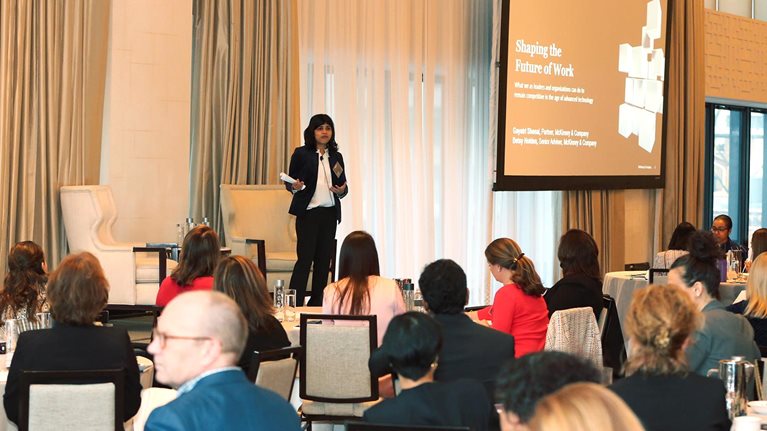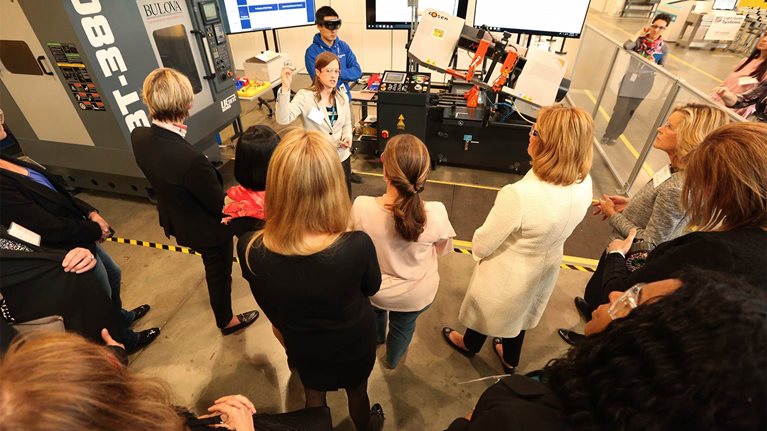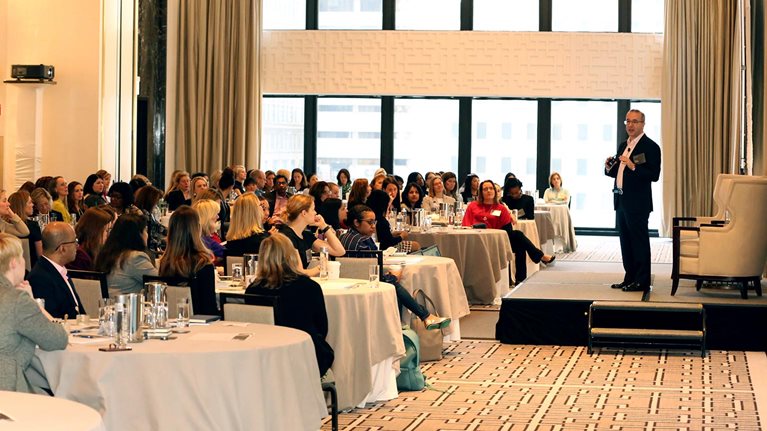“As we think about the nature of work changing now and in the future, it’s really important we make sure women stay competitive,” says Gayatri Shenai, a McKinsey partner. “This is especially critical in areas like tech and operations that are still some of the most underrepresented fields when it comes to diversity.”
That mandate is also rather personal for Gayatri. Like thousands of women working in the male-dominated tech and manufacturing industries, she has often found herself an “only”—or the only person like her at work—in a range of settings from the factory floor to the C-suite. It’s a situation that can be stressful, isolating, and completely disheartening.

But a few years ago, Gayatri decided to do something to help others like her feel less alone. She took it upon herself to organize an annual conference for women executives in tech and operations. This year’s edition took place earlier this month in Chicago.
Over 2 days, more than 100 women from across the tech and operations industries came together to share stories of their experiences and hear from other women leaders who are working to combat onliness in their respective organizations as they prepare for the future of work. McKinsey’s global managing partner, Kevin Sneader, delivered opening remarks before turning over the stage to our distinguished guests.
My hope is that no one here leaves this place feeling like an only.
McKinsey partner, Gayatri Shenai
One of them was former US Secretary of Commerce Penny Pritzker, who talked about her belief in the need for more apprenticeships in the United States. Only about 30 percent of Americans graduate from college, she explained, which she believes makes a clear argument that the road to professional success for most is not paved in a 4-year degree.
“No one in this room is here accidentally,” said Penny. “But there are too many people in this country for whom skill-building opportunities just don’t exist.” Rain Hayes, who is the senior director of quality engineering at Slack, echoed this sentiment. She shared that she had never attended college and is a completely self-taught engineer. And neither is a college degree a barrier to entry on her teams, one of which boasts 3 formerly incarcerated developers who learned how to code while in prison.

“How can we scale this kind of pairing and mentorship in the workforce?” Rain asked.
Betsy Ziegler had some insight. She committed herself to mentorship in her role as CEO of 1871, a hub for Chicago’s digital start-up community that provides entrepreneurs with space, connections, education, training, and early-stage venture capital. She urged the audience to be open to change and to continuously encourage new ideas and working models from teammates.
“If the pace of innovation inside your organization is slower than the pace of innovation outside your organization, you’re on a downward slope,” she said.
Increased velocity is a hallmark of the modern workplace, of course, and according to Nationwide CIO Susan Gueli, “the pace of change is only getting faster; never again will it be as slow as it is today.” She made this real by explaining that the half-life of a learned skill in technology is just 3 to 5 years, which requires teams to regularly reinvent themselves and be resilient.
That point was emphasized by an audience member who recounted how after her company went through an agile transformation that included thorough training, she reapplied for her existing role as head of technology enablement to ensure her skills had evolved as needed.

“I found it fascinating to go through that kind of process,” she said. “It made me feel that much more confident in my abilities to do my job.”
Such resilience is one of the many ways Johnson Controls CIO Nancy Berce has dealt with being an “only.” “While it can often feel lonely,” she said, “it’s taught me to learn how to survive.”
In a personal story, Nancy talked about how she discovered this in her childhood. Raised by a single father in a house with two brothers, she grew up swimming competitively against boys.
...you don’t have to adopt all these fancy tools, do it all, or do it a right way.
McKinsey senior partner, Katy George
At Johnson Controls, where just 17 percent of employees are women, Nancy has reached her goal for the past six months of having 50-50 representation in her group. “If you don’t like the environment you’re in, try working to change it,” she said. “Even as onlies, we should feel we have the power to do that.”
Some, of course, can’t change their environments without significant investment. In Chicago, our attendees had a chance to see the way we help clients learn by stepping outside of theirs for a moment. To see what’s going on at the world’s most cutting-edge factories, the group toured our Digital Capability Center, a working model of a tech-enabled facility. They saw firsthand how augmented reality and other innovations are revolutionizing their industries.
“One of our goals here has been to show people that you don’t have to adopt all these fancy tools, do it all, or do it a right way,” says Katy George, a McKinsey senior partner. “We want people to realize that the barriers to entry for digitization are lower than you might think and the future of work for women is quite hopeful.” Johanne Lavoie, a McKinsey partner, shared research that shows traits most often exhibited by women, like creativity, emotional intelligence, and collaboration have that much more weight as dull and repetitive tasks become more automated.
“I never thought this event would turn into what it is today,” Gayatri says. “We had a simple idea—to bring women in this field together—and now it’s become this amazing event that keeps growing and growing. My hope is that no one here leaves this place feeling like an only.”